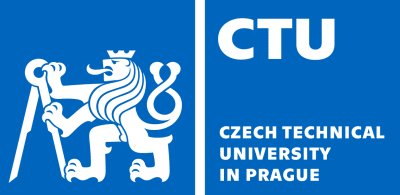
Master in Automation and Instrumentation Engineering
Czech Technical University in Prague

Key Information
Campus location
Prague 6, Czech Republic
Languages
English
Study format
On-Campus
Duration
2 years
Pace
Full time
Tuition fees
CZK 132,000 / per year **
Application deadline
Request info *
Earliest start date
Request info
* Orientation Week: Sept 19, 2023 - Sept 21, 2023
** Application fee: 32 EUR
Scholarships
Explore scholarship opportunities to help fund your studies
Introduction
Automation and Instrumentation Engineering
The program’s focus is on the mastering of the advanced design means in automation and instrumentation and their application, particularly in industrial operations of manufacturing enterprises. In addition to the common and prevailing core of studies, students pass specialized courses with a focus on one of the two areas:
- Automation and industrial informatics
- Instrumentation technology
The common part of the studies emphasizes the acquisition of theoretical and practical insights in the design and implementation of industrial process monitoring and control systems through traditional design means as well as methods relying on artificial intelligence. Combination with sensor and embedded systems and rapid prototyping principles, which also form part of the common studies, creates a potential to master the knowledge and skills required for a comprehensive design of instrumentation and automated and autonomous control of industrial plants in line with the development of the Industry 4.0 vision.
Automation and industrial informatics put an emphasis on education in industrial informatics. Attention is paid to information about the principles of object-oriented programming and its application in information and database systems of industrial operations and enterprises.
Instrumentation pays special attention to the principles of design in precision mechanics emphasizing functionality of the device, often operated under specific conditions, and technological capabilities of production. In this regard, the specialized studies cover the complete design of mechanical and optomechanical apparatus.
Graduate Profile
In the common part of the program, graduates acquire the following knowledge and skills:
- Modeling and control of industrial systems and processes
- Instrumentation Technology and design aspects
- Design and development of industrial controlling and information systems
In Automation and Industrial Informatics, graduates acquire the following additional knowledge and skills:
- Application and design of industrial information and knowledge-based systems Mastering of principles of object-oriented programming and creation of information and database systems for industrial practice Application of software engineering methods
- Aspects of advanced design of monitoring and controlling systems Algorithms for signal processing and identification of mathematical model parameters Optimization principles and their application in the design of predictive controlling systems using mathematical models of industrial processes
Automation and Industrial Informatics graduates are suitable candidates for management positions in all phases of development of automated controlling and industrial informatics systems, particularly in design, development, applied research, and implementation. The topics particularly include designs of the control of mechanical, mechatronics, transport, energy or chemical units, or indoor environment control systems.
In Instrumentation Technology, graduates acquire the following knowledge and skills:
- Analysis, design, and assembly of precision apparatus and devices, all covering devices for measuring traditional quantities and values (pressure, flow rate, temperature, etc.), special apparatus (relying on microtechnology, ultrasound systems for the detection of internal defects of materials, special visualization devices, cameras), clean operations systems, or apparatus supporting natural science research (such as telescopes).
- Support for physical disciplines in precision mechanics and optics, all covering special physical phenomena (holography), modern disciplines of optics (such as fast nonlinear optics (NLO)), or introduction to now already independent and highly sought-after disciplines (such as nanotechnology and photonics).
Instrumentation Technology graduates are able to design apparatus parts or groups or entire instrumentation systems and investment plans from the engineering design and other perspectives. Also, they are capable of designing and realizing an equipment control system and measurement chain. Further, graduates may develop specialized SW applications for recording, processing, and evaluating monitored data. With the above competencies, program graduates are suitable candidates for jobs at manufacturers of instrumentation or automation technology, enterprises using automation and devices for its own production, or research organizations.